Eco-Alianza Food Security Program Provided a Five-Month Respite for Thousands of Loretanos

Eco-Alianza staff photo
For the last six months, Eco-Alianza’s employees, donors, and volunteers have played a critical role in seeing Loreto through an extraordinary time – the sudden exodus of most part-year Loreto residents, rampant unexpected unemployment, and the uneasy arrival of the COVID-19 pandemic. At its peak, Eco-Alianza’s Temporary Food Security Program for Unemployed Workers was providing twice-monthly food “despensas” to 2,300 local families. With an average of 4.0 people per family served, that’s 9,200 people, or roughly half of Loreto’s population.
The program began the first few days of April, when a rapidly assembled planning committee conceived of a concrete way to transform compassion into meaningful action. On April 7 an appeal letter went out to Eco-Alianza supporters, and a week later it was clear that the financial support would be significant. Staff went to work figuring out COVID-19 -safe application procedures and methods of distribution, designing and printing food vouchers, negotiating with local food stores and suppliers, and interacting with relief agencies and groups to avoid duplication of services. Applications poured in and less than a month after the program was conceived, “despensas” were being distributed.
Final results are still being tabulated, but through the Eco-Alianza program more than 14,900 food packages, each containing 24 items, were distributed between May 1 when distributions began, and the end of September. The program initially was designed to last three months to give unemployed workers and their families a leg up, but the extraordinary response to our April 7 funding appeal made possible an additional two months of food distributions. More than 350 generous donors, including many from our Sister Cities of Ventura and Hermosa Beach, CA, contributed funds. All donations were matched 2:1 by Christy Walton’s Alumbra Innovations Foundation through Eco-Alianza’s close connection to the International Community Foundation.
Eco-Alianza Treasurer Linda Kinninger pledged at the outset of the rapidly developed program that every cent of the donations and the matching funds would go to buy food and hygiene items from locally owned stores to help local families. And that’s exactly what occurred. Salaries for Eco-Alianza staff members, working on the program from their homes and on site, were paid entirely from funds generated through last year’s GALA auction.
A total of 67 people were involved in managing and operating the program, including the planning committee, government allies, the application committee, the distribution committee, and supplier allies. The utmost care was given to coordinating with other relief efforts to avoid duplication, and to verifying that each “member” recipient of program benefits had indeed become unemployed due to the pandemic.
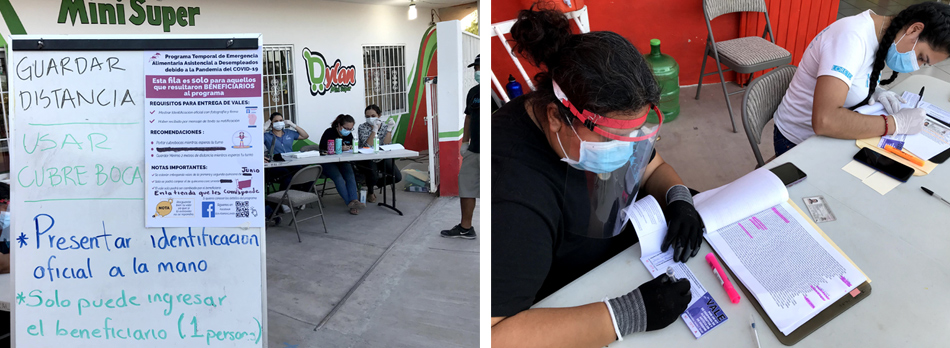
The program’s purpose was “to serve the most vulnerable families in the productive sector of the municipality of Loreto who became unemployed as a result of the current crisis caused by COVID-19, providing a rescue that complements their food and hygiene security.”
As the program’s funding now nears completion, local COVID-19 protocols have begun to ease, and many workers already are back on the job. Hugo Quintero Maldonado, Eco-Alianza’s President and Co-Founder, said that during September dozens of food recipients have contacted Eco-Alianza to be taken off the distribution list, including those who have returned to work and also some who moved away from Loreto. A final program report will be produced in mid-October.
Discussions with staff members, all of whom helped to administer the program, revealed one overwhelmingly consistent report from interactions with program members. “No matter what family was receiving food, whether they were fishermen or waiters or tour guides or car washers, they expressed a profound sense of gratitude to Eco-Alianza’s staff and to the donors whose generosity funded the program,” Hugo said.
Dozens and dozens of comments backed up that sentiment on the Facebook group site specifically set up to communicate with members receiving despensas. Following are just a few typical comments (names removed for the sake of anonymity):
“Thanks to the entire Eco-Alianza team for their great selfless generosity in support of hundreds of Loretano families, ah, like me personally. God bless you and return to you doubly. Very good work for all the effort, and from me a thousand thanks!”
“Thank you, ECO ALIANZA for your great support. BLESSINGS, to the entire TEAM”
“Thank you for your work, your help (during) these days of quarantine was excellent.”
“No one had approached even to ask if as a result of the pandemic some help was needed. Suddenly your association made this great effort to provide us with necessary items. So many of us were unemployed, others had to get by with a low salary; thanks to you for the help and also to the people behind you. . .thank goodness for your program. I wish with all my heart that God take care of you and multiply your blessings. Greeting and hugs from a distance. THANK YOU!!”
“Thank you Eco-Alianza for your great support during this time of unemployment. God bless you always.”
As reported in our June Soundings, in addition to feeding unemployed workers and their families, the program has benefitted the local economy and employment of local food store workers, who have assembled the despensas and distributed them as recipients redeemed their vouchers. Most other food security programs on the peninsula purchase pre-packaged despensas from businesses in mainland Mexico. The funds that flowed through the 11 locally-owned participating stores throughout the Loreto communities mostly stay in the Loreto economy. Hugo pointed out that food store owners and workers entirely adopted the spirit of the program, working overtime and going well out of their way to serve the program’s beneficiary members.
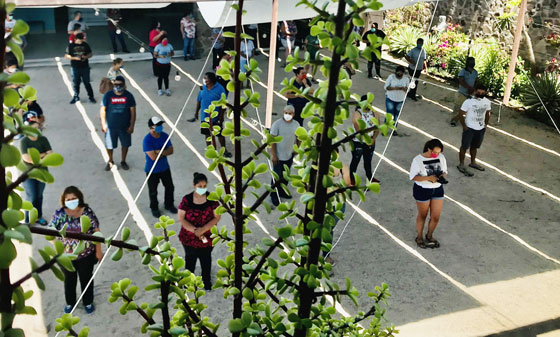
As a good example, Hugo said, one elderly woman arrived for the first distribution pushing a wheelbarrow because she had no other means of transportation. The participating store subsequently delivered the despensas to her home. Likewise, he said, participating stores or their employees delivered to wheelchair-bound members, to members who were positive for the COVID-19 virus, and to members suffering from an outbreak of measles. Although most recipients were in the Loreto area, more than 400 member families reside in very remote ranches or small communities throughout the municipality, and the stores went to great lengths to reach out to make sure everyone received their despensas.
Hugo also pointed out that while some government assistance programs were criticized for being very selective, the Eco-Alianza program complemented their work effectively, serving many Loretanos “who otherwise might have slipped through the cracks,” Hugo said. “These included a lot of people in need who clean cars, those who collect and sell scrap and recyclables, those who were in transit doing seasonal agricultural work in San Juan de Londo, and many unemployed single mothers providing for themselves and their children. Also many professionals suddenly needed help, including construction officers, child care workers, specialized employees of stores and businesses that closed during the lockdown, and teachers from private schools.”
Hugo specifically mentioned a group that Eco-Alianza already had been working with very closely on conservation-related issues, namely “Capitanes Lorertanos” captains of fishing boats, tourist boats, and other service providers associated with the marine park. “This program certainly built good will all around,” he said, “as several of them specifically said they’ll be happy to help us in our conservation programs in the future.”
As part-year residents return to Loreto, the legacy of Eco-Alianza’s work, and of its supporters, is readily apparent in the healthy faces on every street and in the hopeful attitudes expressed in the shops, restaurants, hotels, and throughout our “Magic Town.”
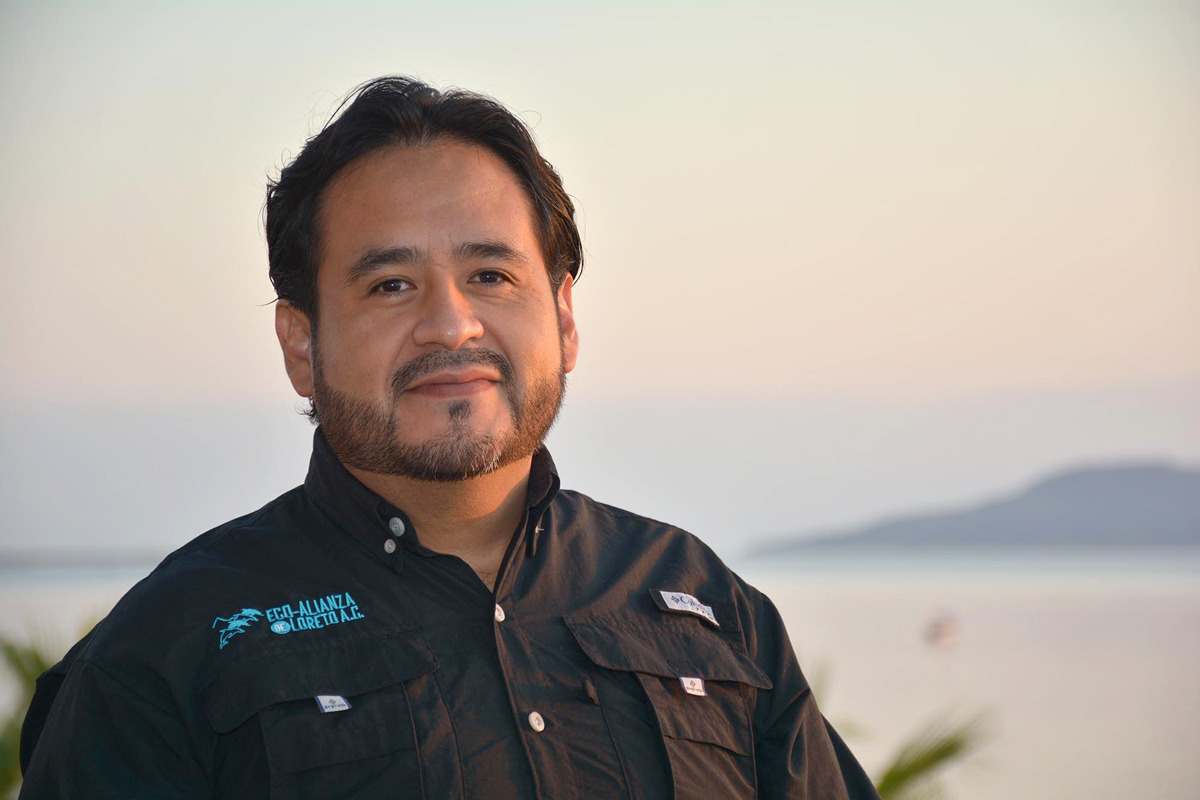
Earlier this month, Eco-Alianza took an important and long-anticipated step to strengthen its programs, especially in the area of marine biology and fisheries science. Ulises Méndez García began his role as Eco-Alianza’s Programs Director on September 15. In that capacity he will have overall responsibility for the planning and implementation of all of Eco-Alianza’s programs.
In addition to an undergraduate degree in Marine Biology from UABCS, Méndez has earned a master’s degree in Business Administration from Anahuac University and a master’s degree in sciences in the Use, Management and Preservation of Natural Resources, with a specialty in fisheries, from the Centro de Investigaciones Biológicas del Noroeste (CIBNOR).
Ulises and his wife Perla Lozano are moving to Loreto from Cancún this month, along with their new baby. They are well known in Loreto, having lived here 13 years ago when Perla worked with PNBL and on a contract with Eco-Alianza, and Ulises was beginning his career with the international conservation nonprofit RARE and its Pride campaign.
Since that time, Ulises has held increasingly responsible management positions with RARE and its Fish Forever program, which has extensive fisheries programs in eight countries. According to RARE’s website, “Fish Forever is Rare’s community-led solution to revitalize coastal marine habitats, such as coral reefs, mangroves and seagrasses, protect biodiversity, and secure the livelihoods of fisher households and their communities.” Since 2015, Ulises has served as the Senior Manager for Technical Operations with RARE’s Fish Forever Global Team, managing Fish Forever country teams in Brazil, Indonesia, Mozambique, and the Philippines. Prior to that, he served for four years as RARE’s Pride Program Manager/Fisheries Technical Manager for RARE Latin America. He conducted site monitoring visits and personalized support to 12 campaigns (behavior adoption/change campaigns) in Mexico, Belize, Guatemala, Honduras, and Ecuador.
Throughout his career, Ulises has combined technical expertise with grassroots campaign building and social marketing, involving fishers and fishing cooperatives, NGO partners, and local and national authorities. He has a depth of experience with fisheries management plans, using management tools including no-take zones, seasons, catch sizes, and quotas to accomplish both conservation and economic/community support objectives. When he worked here from 2007 to 2011 he was co-leader of the program of sub-aquatic monitoring of fishing and non-fishing zones in PNBL, in collaboration with the nonprofit Comunidad y Biodiversidad (COBI). Ulises is a scuba diver and certified dive master.
When you see Ulises and Perla around town, please welcome them back to Loreto and Eco-Alianza, and congratulate them on their wise decision to raise their family here instead of in Cancún!
Pandemic Forces Postponement of Eco-Alianza Events
Like most organizations, Eco-Alianza has been repeatedly challenged with planning public events in the age of COVID-19. Sadly, our film festival, which we already had postponed from March until October, needs to be postponed once again. We’ve now decided to celebrate it next year, along with Earth Day! Please mark your calendar for the One Ocean Film Festival – April 23/24, 2021. All tickets that were sold for the original date will be honored, as will requests for refunds.
Additionally, our 13th Anniversary Gala will now be celebrated along with the Eco-Alianza 14th Anniversary Gala – Saturday, November 13, 2021. We look forward to seeing you there!
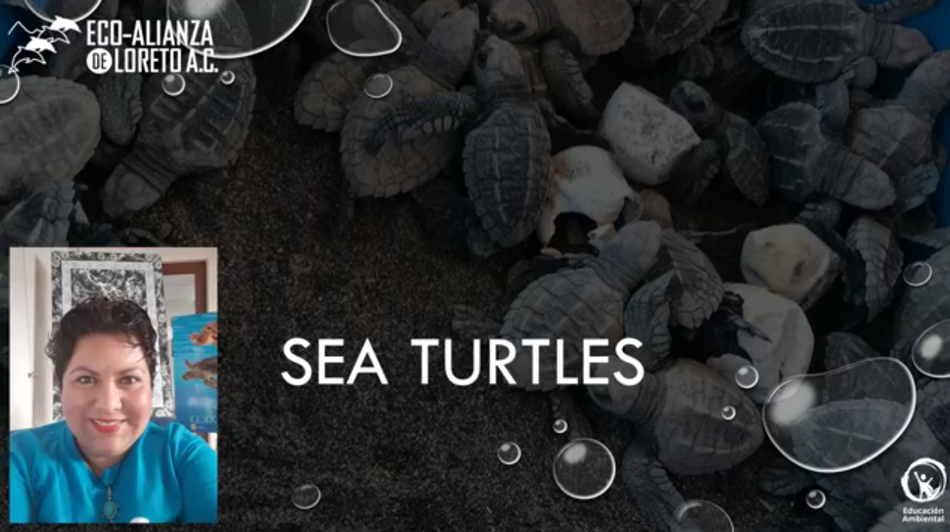
Just as many school systems throughout the world have adapted to online learning opportunities, Eco-Alianza’s education staff this summer began presenting online video workshops, and immediately got a great response. The inaugural online workshop took place in six 40-minute sessions between August 17 and 21. Eco-Alianza President Hugo Quintero says this may be a precursor to much more of the same, possibly including live-streamed Visiting Scientist presentations.
The workshops were publicized through various WhatsApp and Facebook environmental education groups, which further expanded the reach, Alma said. “We had the pleasant surprise of being seen from Santa Cruz de la Sierra in Bolivia, Alajuela-Costa Rica, Ecuador, Colombia, and other states of the Mexican Republic, including CDMX.” This workshop received staff support from the Bay of Loreto National Park (PNBL) as well as the regional nonprofit Grupo Tortuguero de las Californias; other workshops being developed are further engaging members of the Loreto Environmental Educators Network (REAL) and Eco-Alianza’s Club of Environmental Leaders (CLAL). The subjects, objectives, and activities are an extension of Eco-Alianza’s ongoing Discovering Natural Treasures project, strengthening community knowledge of the importance of conservation of local species and ecosystems.
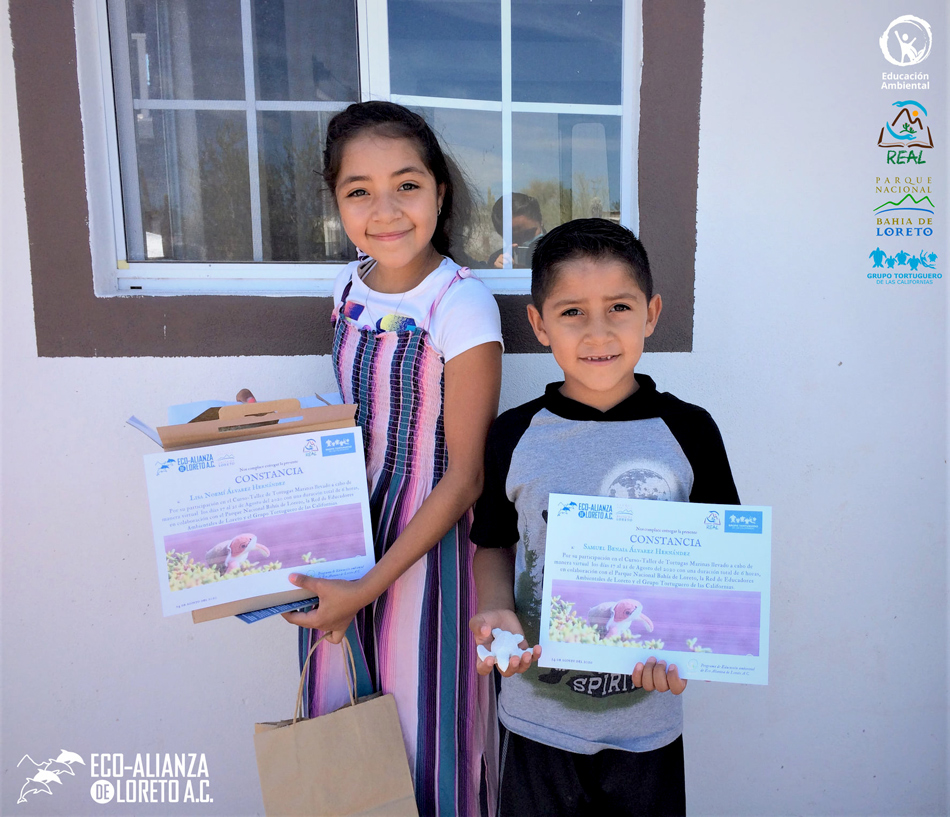
Alma pointed out that the sea turtle workshop, which in the past has drawn about 25 local children with direct contact, now has the potential to reach an unlimited audience. While in the past we hoped and expected local children to gain understanding of the need for conservation here in Loreto, and to have a positive impact on PNBL, the new format through Facebook could impact many more parks. “Some of our participants will use the knowledge to support protected natural areas such as Galapagos National Park, Chiquitanía, Juan Castro Blanco National Park, Cabo Pulmo and Bahía Espíritu Santo,” she said.
“I see a more open, evolved future, with more people accessing information and data; for many, there were no longer the pretexts of time or distance, and we will continue,” Alma said. In fact, the next workshop, Reduction and Reuse, began September 28 and will run through October 2. “It is aimed at whole families, not only children, mainly teaching parents reduction strategies that will not only benefit the environment, but will also be reflected in the economic benefit due to the reuse and use of waste.”
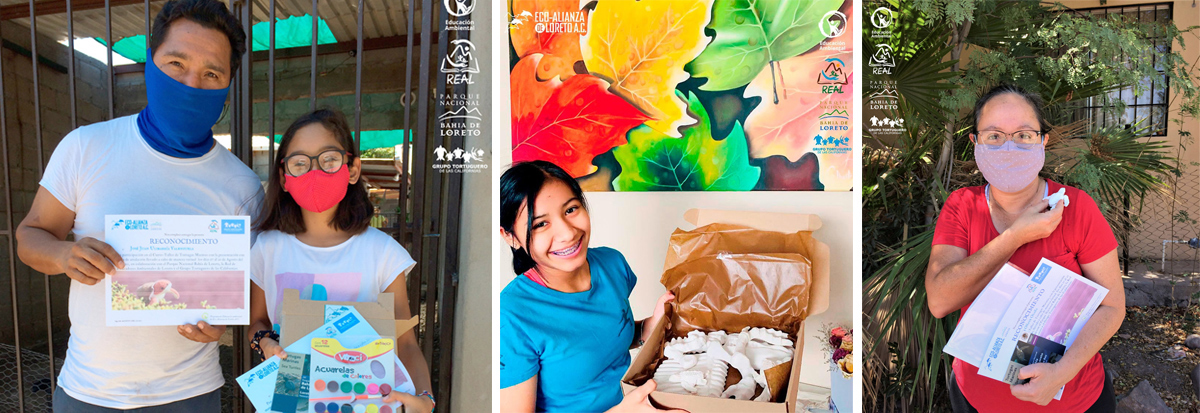
Education Program Coordinator Alma Rico said the workshops drew between 30 and 35 young students each day, at the very least. Although the programs were aimed at children, she said, “many parents accompanied their children during broadcasts, increasing the number of viewers.”
Specific information on the free workshops is available on the Eco-Alianza Facebook page, including videos of each of the Sea Turtle presentations. She said the presentations soon will be published individually through Facebook and the other platforms we manage such as YouTube, Instagram, Twitter, LinkedIn, etc…
Prizes were also awarded to those who actively participated during the broadcasts, which included plaster figures for painting and informational materials about turtles, made by Eco-Alianza and provided by Grupo Tortuguero. Project Assistant Jennifer Ruelas supported Alma with recordings and broadcasts, and Communications Director Magda Gutierrez also participated. From the REAL educators group, Francisco Alvarez, Tere Oñate, Juan Ulibarria, and Mariana Salgado from PNBL also took part.
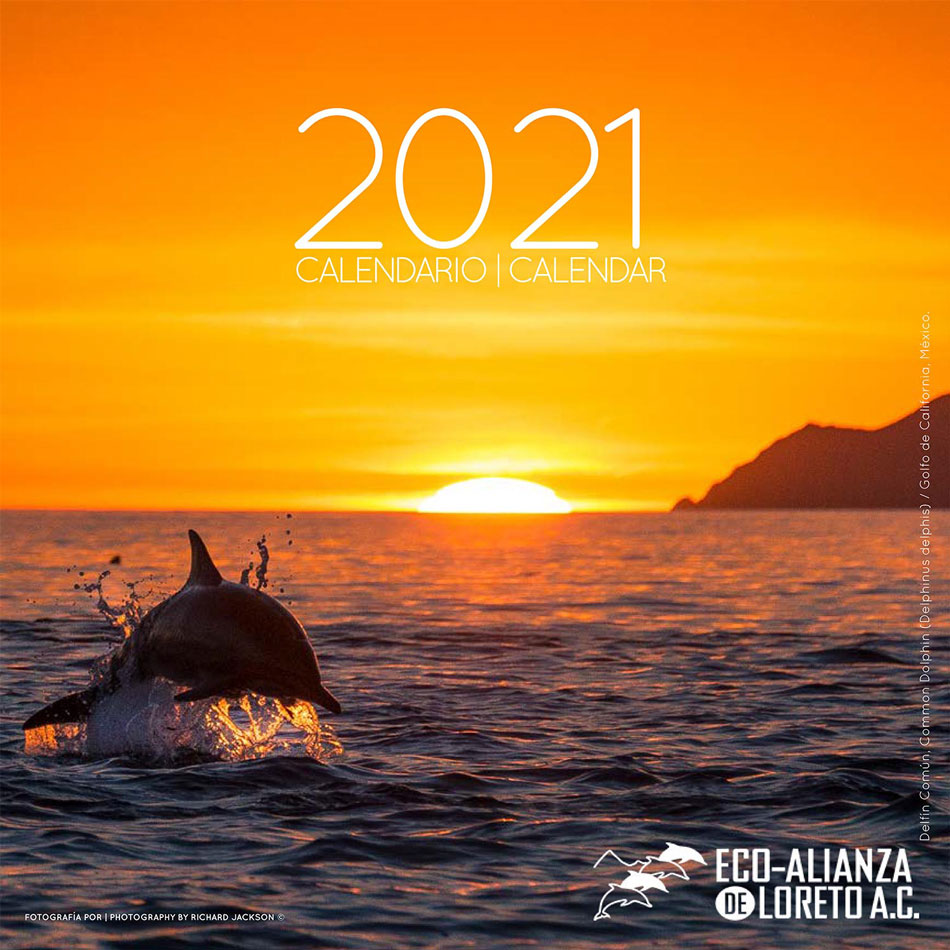
Eco-Alianza’s 2021 Calendar, featuring astounding landscapes and wildlife images by photographer Richard Jackson, is now available by mail and will be available very soon in Loreto shops near you, as well as at Eco-Alianza’s downtown headquarters. Loreto comes to life in these photos, so they make the perfect gift!





